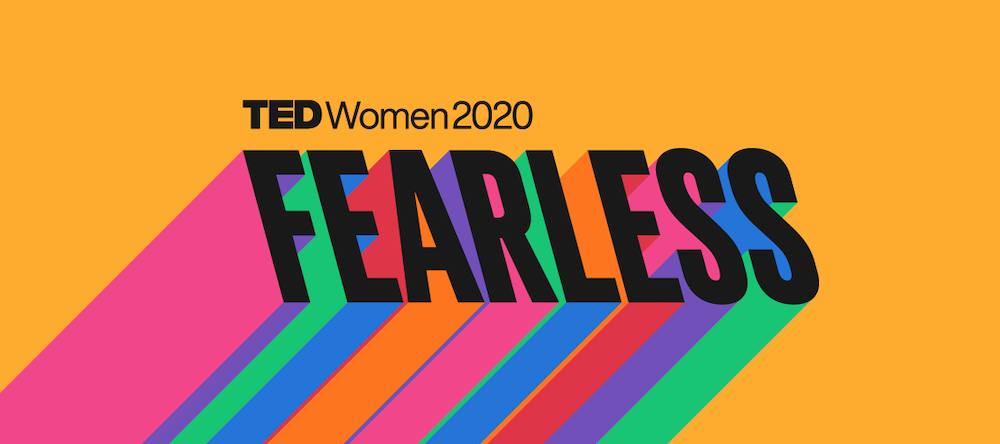Onward! Notes from Session 3 of TEDWomen 2020
Author: Erin Gregory
Go to Source
For the culminating session of TEDWomen 2020, we looked in one direction: onward! Hosted by TEDWomen curator Pat Mitchell and TEDx learning specialist Bianca DeJesus, the final session featured speakers and performers who shared wisdom on preparing for new challenges, turning fear into action and finding the way forward — even when the path isn’t clear.
Special appearance: Kirsty de Garis, organizer of TEDxSydney, and Safra Anver, organizer of TEDxColombo, introduced the final two TEDx speakers of the day.
The session in brief:
Gloria Steinem, feminist activist, writer
Big idea: Feminism is the radical yet essential idea that all human beings are equal. Now more than ever, unity and listening are the remedies to fear, discrimination and inequality.
Why? Feminism has been and always will be relevant and vital to all of humanity, says Gloria Steinem. Yet throughout history, the word — and its accompanying movement — have been misunderstood and criticized. Speaking on her lifelong legacy of feminist activism, Steinem shares how she’s fought for women’s rights and overcome her fears with the help of trusted friends and allies. She discusses the intersectionality of racism and sexism and how the fight against both has always been linked — and explains why unity is the key to overcoming them, especially in a world facing COVID-19. She urges future generations of women — or, as she calls them, “friends who haven’t been born yet” — to support each other and face their fears together. “Think of change as a tree,” she says. “You know it doesn’t grow from the top down, so we shouldn’t be waiting for somebody to tell us what to do. It grows from the bottom up. And we are the roots of change.”

“AI is making amazing things possible for organizations and for people who otherwise would have been left behind,” says Jamila Gordon. She speaks at TEDWomen 2020 on November 12, 2020. (Photo courtesy of TED)
Jamila Gordon, AI advocate
Big idea: Artificial intelligence can break language, education and location barriers for disadvantaged people, giving them the opportunity to thrive.
How? Born into a war-torn Somalia, Jamila Gordon has always considered herself to be lucky. When her family was separated and she was displaced in Kenya, Gordon’s journey eventually took her to Australia. There, she worked in a Japanese restaurant owned by a couple who showed her that amazing things are possible through hard work and perseverance. Now, she wants AI to do the same, at a massive scale, for disadvantaged people — giving them skills and tools to find work, be great at their jobs and do the work safely. In this way, Gordon believes software can open doors of opportunity for people who face cultural, social and economic barriers. For instance, Gordon’s platform, Lumachain, brings transparency to global supply chains, benefiting producers, enterprises and consumers, while also helping to end modern slavery.
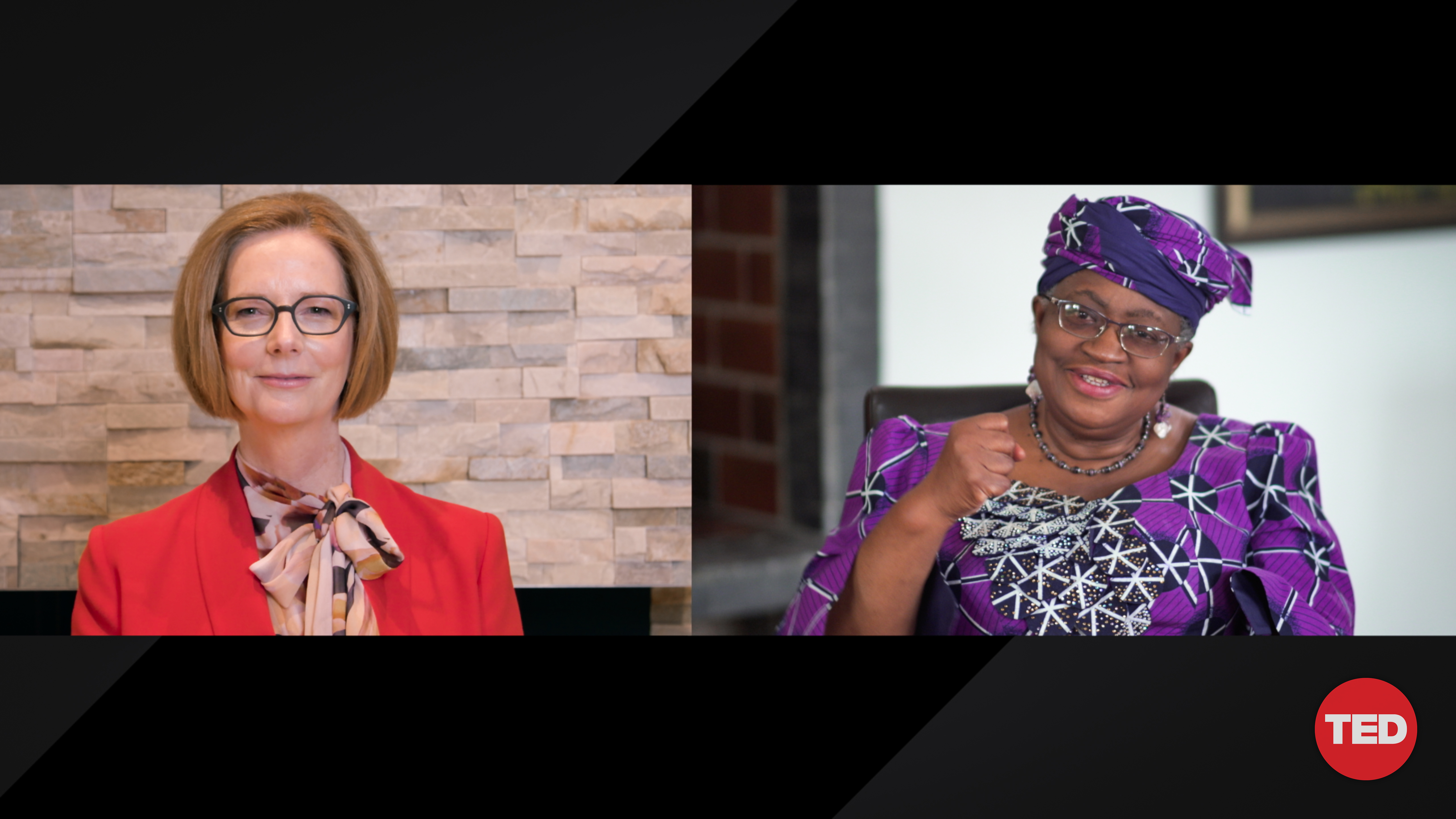
“There’s joy in being a leader, in having the opportunity to put your values into action,” says Julia Gillard, in conversation with Ngozi Okonjo-Iweala at TEDWomen 2020 on November 12, 2020. (Photo courtesy of TED)
Julia Gillard, former Prime Minister of Australia, and Ngozi Okonjo-Iweala, former Finance Minister of Nigeria
Big idea: The sexism that women leaders face shouldn’t overshadow or discourage others from stepping forward and making a positive impact.
Why? In conversation, Julia Gillard and Ngozi Okonjo-Iweala remark and reflect on their experiences in leadership — for better and worse. Their discussion runs the gamut of what it means to be a powerful woman in a sexist world: encountering unnecessary judgments based on appearance, enduring undue focus on personality over policy and facing criticism based solely on stereotypes. To be viewed as an acceptable leader, women must exude both strength and empathy, Okonjo-Iweala says. If they come across as too tough, they are viewed as hard and unlikeable. But if they seem too soft, they are seen to be lacking the backbone to lead. In fact, women leaders must also be thoughtful about how they portray their achievements to those who look up to and follow them. Emphasizing the positive makes a real difference to the power of role modeling, Gillard says. If the focus stays on the sexist and negative experiences, women may decide that being a leader isn’t for them. Conversely, if leaders shy away from speaking about their hardships, women and girls can be put off because they decide leadership is only for superwomen who never have any problems. It’s all about balance. For women looking to create space for themselves and others, Gillard and Okonjo-Iweala offer a list of six standout lessons to build solidarity: there’s no “right way” to be a woman leader, so be true to yourself; sit down with your trusted confidants and wargame how to deal with gendered moments; debunk gendered stereotypes; don’t wait for when you need help to support system changes that aid gender equality; network, but don’t shy away from taking up space in the world; and the last, but not least important: go for it!
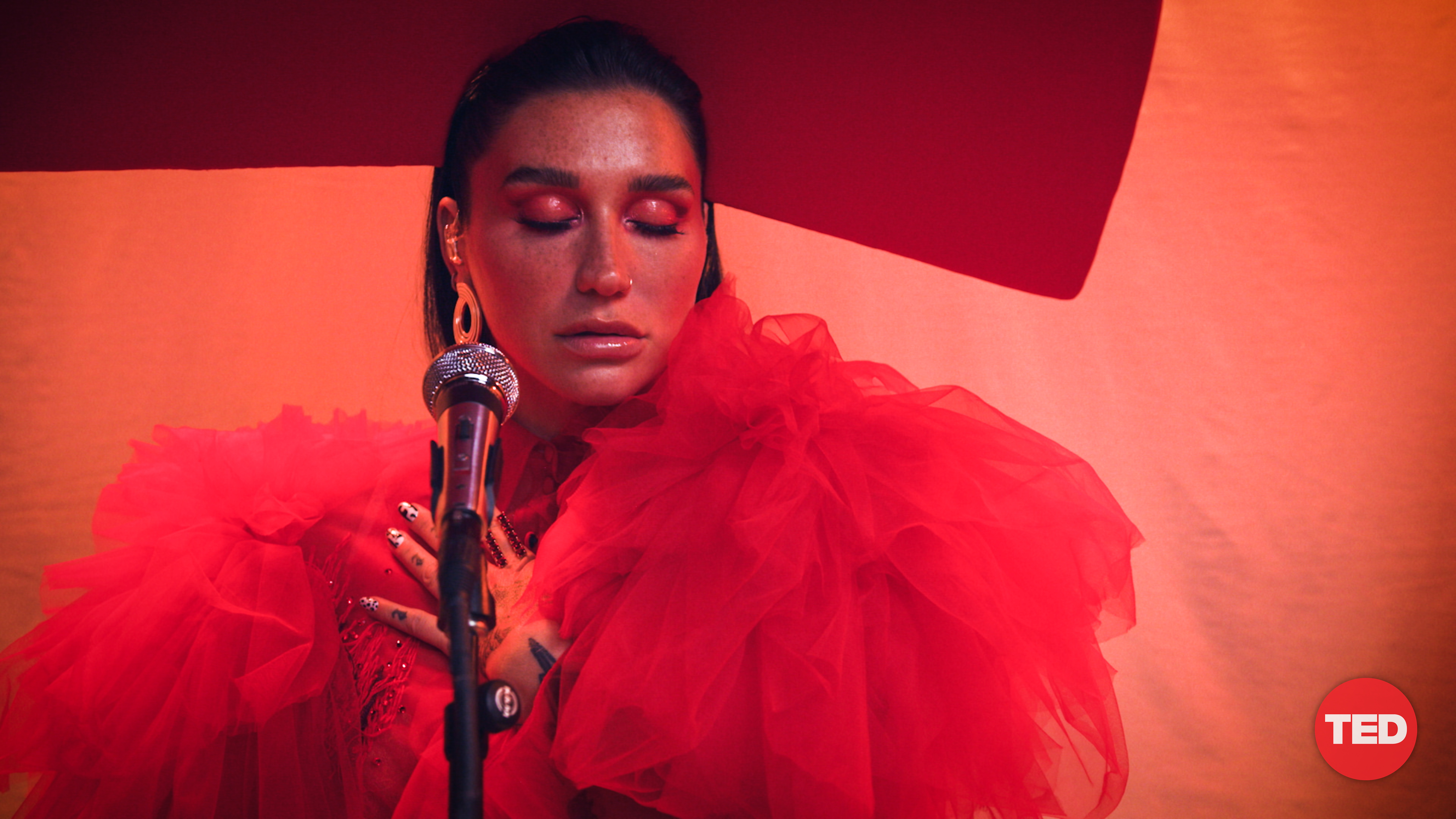
Kesha delivers a powerful performance of “Shadow” at TEDWomen 2020 on November 12, 2020. (Photo courtesy of TED)
Kesha, musician, actress, activist
“I can’t tell you how to not be afraid, but I can tell you that I’ve experienced how to not be defined by my fears,” says Grammy-nominated singer-songwriter Kesha. She shares a bit about how she faced her fears while living in the limelight over the last decade and delivers a powerful performance of “Shadow,” a song about courageously choosing positivity even when others are throwing shade. “Get your shadow outta my sunshine / Outta my blue skies / Outta my good times,” she sings. She’s accompanied by Mary Lattimore on harp, Karina DePiano on piano, and Skyler Stonestreet and Kenna Ramsey on background vocals.
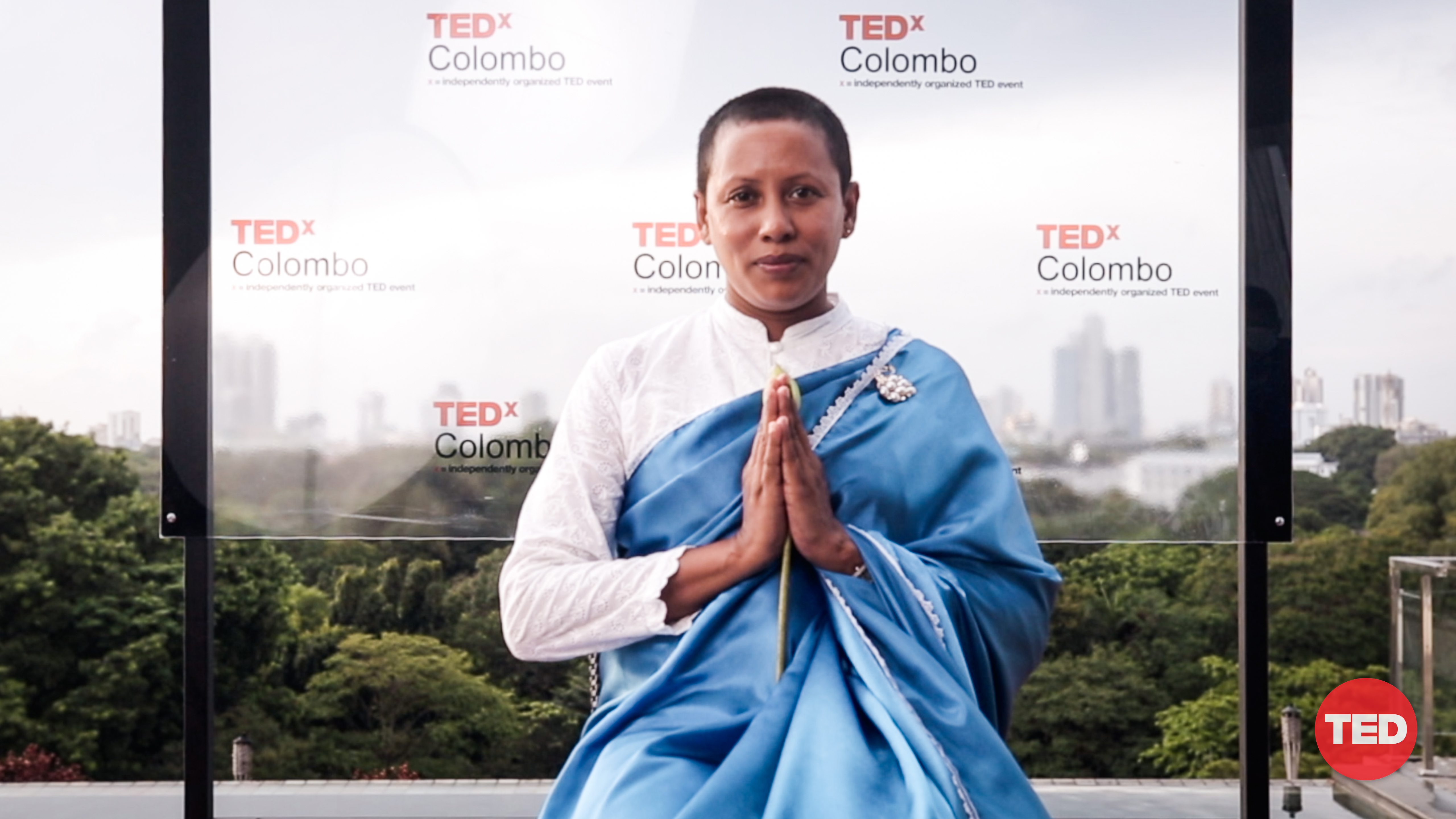
JayaShri Maathaa shares a magical mantra to calm yourself during troubled times. She speaks at TEDWomen 2020 on November 12, 2020. (Photo courtesy of TED)
JayaShri Maathaa, monk
Big idea: There is a simple mantra you can say to calm yourself during troubled times: “Thank you.”
Why? As the world brims with fear, doubt and anxiety during the coronavirus pandemic, JayaShri Maathaa finds that two magical words — “thank you” — fill her life with bliss and grace. How so? When you say “thank you,” you bring your attention inward and, over time, create a feeling of gratitude in your heart that can help you navigate life with peace and joy. For Maathaa, these two words are like music in her mind: they’re the first thing she thinks upon awakening, and the last thing she thinks before falling asleep. By planting these good thoughts in her mind and heart over the years, she now finds them blossoming into something beautiful — creating a harmony within herself and to the world around her. Want to give it a try?
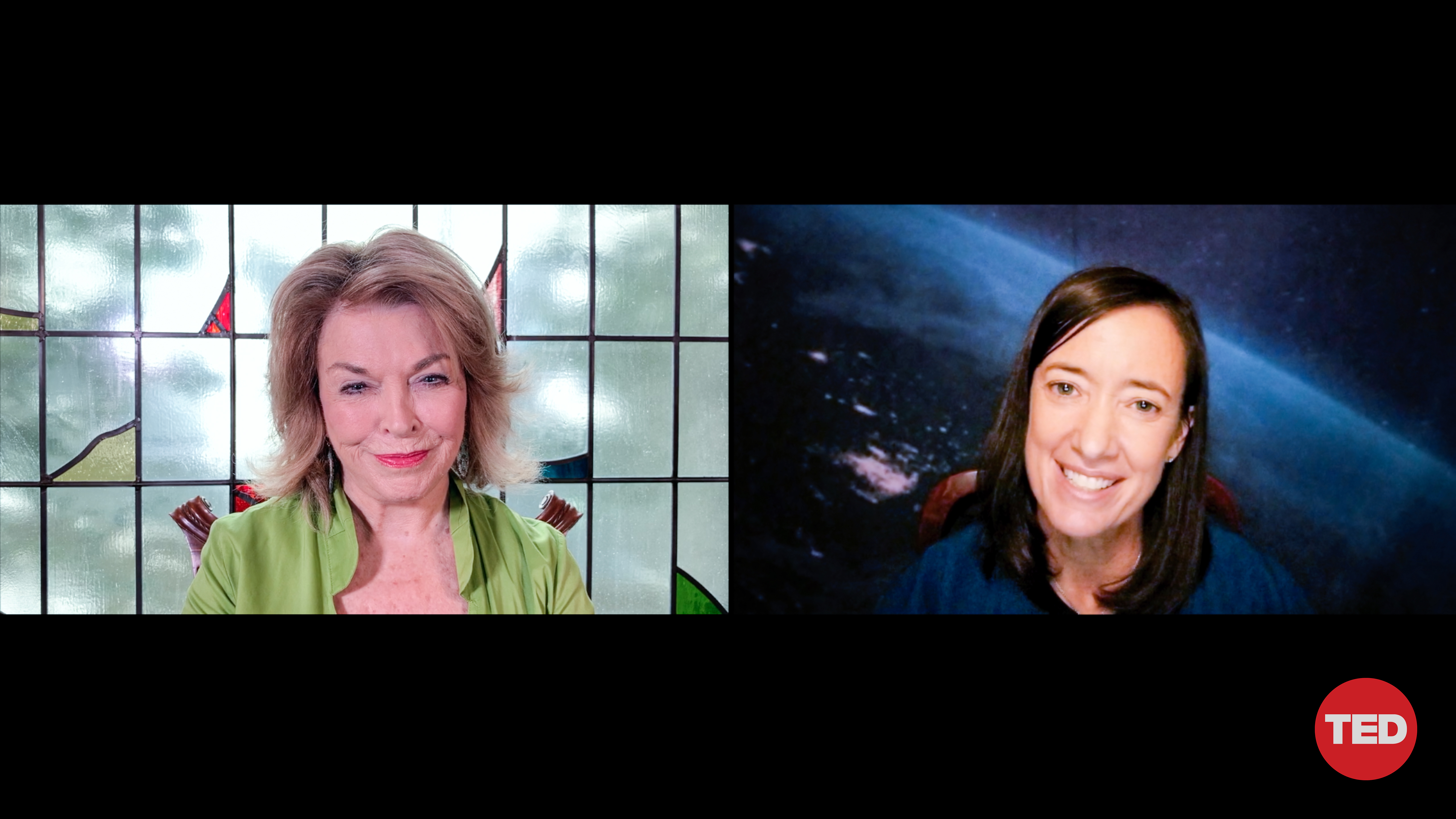
Megan McArthur shares lessons from her life and career as a NASA astronaut, in conversation with TEDWomen curator Pat Mitchell at TEDWomen 2020 on November 12, 2020. (Photo courtesy of TED)
Megan McArthur, NASA astronaut
Big idea: The day, life and mindset of an astronaut.
Tell us more: In conversation with TEDWomen curator Pat Mitchell, astronaut Megan McArthur offers a glimpse into what it’s like when space becomes your world, but not your entire life. As a mother and wife (she’s married to fellow astronaut Bob Behnken), McArthur strikes a balance between the emotional outpouring of her husband’s spaceflight and training for her own launch, while supporting their son for his reality as an earthbound child. But when it comes to work, the focus becomes singular in hundreds of hours of preparation, which MaArthur emphasizes can be a mindset easily adjusted and applied to any professional role. Using her own example of tackling a new job, she reminds women that even if they come up against a situation they’ve never before encountered, they are ready and prepared from their life experience to take on that challenge, learn quickly and succeed.
Closing out the final session with a flourish, a guitarist sets in motion delicate yet strident chords that reflect both the warmth and momentum of Apiorkor Seyiram Ashong-Abbey‘s poetry — paired with footage of her masked, standing statuesque in a deserted quarantine courtyard, motionless yet liquid all at once. Far from a mere diatribe, this piece proposes not a revolution, but a re-establishment of the majesty, magic and power of the matriarch, and the hidden traditions that have quietly sustained women for millenia — and that will someday soon renew the world once more.

